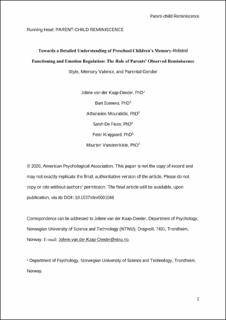| dc.contributor.author | Van der Kaap-Deeder, Jolene | |
| dc.contributor.author | Soenens, Bart | |
| dc.contributor.author | Mouratidis, Athanasios | |
| dc.contributor.author | De Pauw, Sarah | |
| dc.contributor.author | Krøjgaard, Peter | |
| dc.contributor.author | Vansteenkiste, Maarten | |
| dc.date.accessioned | 2021-10-28T06:48:56Z | |
| dc.date.available | 2021-10-28T06:48:56Z | |
| dc.date.created | 2020-09-30T05:46:36Z | |
| dc.date.issued | 2020 | |
| dc.identifier.citation | Developmental Psychology. 2020, 56 (9), 1696-1708. | en_US |
| dc.identifier.issn | 0012-1649 | |
| dc.identifier.uri | https://hdl.handle.net/11250/2826122 | |
| dc.description.abstract | This study examined the role of parents’ reminiscing style in preschoolers’ memory-related functioning and general emotion regulation. In 87 families, each parent rated their child’s (Mage = 4.07 years, SD = 0.80) emotion regulation and discussed a positive and a negative memory with their child (resulting in 275 conversations). Multilevel analyses showed that children’s rated engagement during the conversation was higher when parents were observed to use autonomy-supportive, elaborative, and positive evaluative reminiscing, while children’s rated disaffection was predicted by low autonomy support, low elaboration, and negative evaluation. Parental positive evaluation also related positively to children’s memory performance. With respect to emotion regulation, only parents’ negative evaluation when talking about negative memories related to higher emotional lability. | en_US |
| dc.language.iso | eng | en_US |
| dc.publisher | American Psychological Association | en_US |
| dc.title | Towards a detailed understanding of preschool children’s memory-related functioning and emotion regulation: The role of parents’ observed reminiscence style, memory valence, and parental gender | en_US |
| dc.type | Peer reviewed | en_US |
| dc.type | Journal article | en_US |
| dc.description.version | acceptedVersion | en_US |
| dc.rights.holder | © American Psychological Association. This paper is not the copy of record and may not exactly replicate the authoritative document published in the APA journal. Please do not copy or cite without author's permission. | en_US |
| dc.source.pagenumber | 1696-1708 | en_US |
| dc.source.volume | 56 | en_US |
| dc.source.journal | Developmental Psychology | en_US |
| dc.source.issue | 9 | en_US |
| dc.identifier.doi | 10.1037/dev0001048 | |
| dc.identifier.cristin | 1835208 | |
| cristin.ispublished | true | |
| cristin.fulltext | postprint | |
| cristin.fulltext | postprint | |
| cristin.qualitycode | 2 | |
